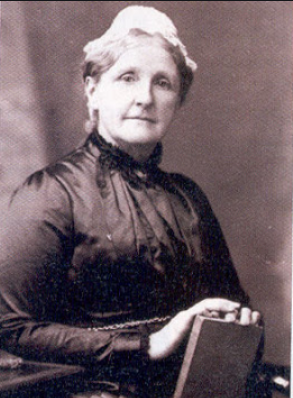Women, considering their slack of theological education until recent times, have played a disproportionate role in propagating the doctrine of universal salvation.
Lady Julian of Norwich and St. Macrina spoke of the possibility universal salvation. Women were prominent in universalist circles in the nineteenth century, and Universalists were the first denomination to ordain women.
Robin A. Perry in A Larger Hope? Universal Salvation from the Reformation to the Nineteenth Century examines Hannah Whitall Smith (1832-1911), an exponent of universal salvation.
Her tender feelings toward her children shaped the way she thought of the bliss of heaven and of the love of God: “I think this feeling has taught me more of what God’s feelings are towards his children than anything else in the universe…. In fact most of my ideas of the love and goodness of God have come from my own experience as a mother.” She conceives of a mother’s love as a reflection of God’s love, for humans are divine images. God’s love, therefore, cannot be inferior to a mother’s own love for her children — for the latter is only a pale reflection of the former —it must infinitely exceed it.
(A father’s love is also like this, as we see in the Parable of the Loving Father and the Prodigal Son. Shortly after my first child was born, I held him in my arms and I suddenly felt such a river of pure and sweet love for him bursting out of my heart that I realized that that love could not have come from my selfish and sinful heart, but was coming from God through me, perhaps, I hope purifying me. But the thought that he could be forever lost is unendurable. And such is the feeling God has about us. He would die one the cross and descend into hell lest anyone be lost)
For Friedrich Schleiermacher religion was the unmediated feeling of unity with the absolute through discovery of the infinite in the finite, the Anschauen des Universums. Women, who have a greater capacity for feeling, in the traditional Aristotelian analysis, therefore have the primary religious experience. Feelings in this sense are not just emotions, but a deep sense prior to analytic reason, such as a sense of the meaning of beauty or of the mysterious correspondence of human mathematical formulae to the exterior world.
Schleiermacher noticed that women have a more continuous emotional and religious development than men, whose lives are characterized by struggle and discontinuity and conversion, Sturm und Drang. (He may have been thinking of Augustine in contrast to Monica.) In Schleiermacher’s Christmas Eve, A Dialogue (of the Platonic variety), the characters discuss men, women, and Christmas.
Leonhardt claims that men are more Christian, because “Christianity is always speaking of a conversion, a change of heart, a new life.” Karoline replies, “Christ himself…was not converted.” Christmas, Eduard continues, is the celebration of the immediate union of the human and divine, in which no conversion is needed. Women, both because of their greater unity of life and their experience of unity with the child, have a stronger consciousness of the unity of the divine and human, and that is the reason, Eduard continues, “why they are so much more fervently and unreservedly attached to the church.” The heart has reasons which the mind knows not, and is a better guide to ultimate reality than reason is.
Women have a greater sense of unity with other people because of their capacity for motherhood. Being able to carry another person nine months under her heart gives a woman a much stronger sense of human connection than a man has, and it continues with nursing. It would follow that women are more likely to believe in universal salvation: the thought that anyone, especially a child (and we are all children of someone), could be lost forever is unendurable.
This of course does not prove the truth of the doctrine, but it suggests one reason why it did not trouble theologians (99%+ male, and mostly celibate) with few exceptions. Were there any women theologians who held the strict Calvinist doctrine of double predestination?
